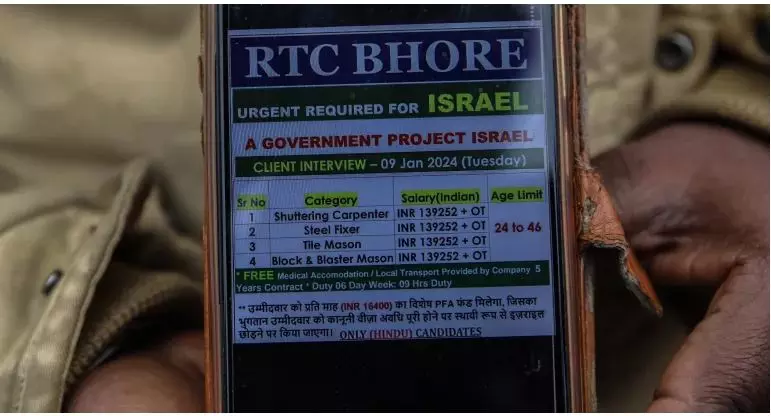
Indian workers choosing conflict-hit Israel challenges India’s economic success claims
text_fieldsDespite reports indicating no guarantee for jobs, Indian labourers are undeterred in their journey to Israel to lessen the labour crisis caused by the Israeli government's decision to block tens of thousands of Palestinians from working within its borders, following the Hamas attack on October 7.
Israeli construction companies, facing the suspension of Palestinian work licenses, have urged their government to permit the hiring of up to 100,000 Indian workers to fill the void.
The willingness of Indian labourers to work in a war-prone country, despite reports suggesting they will not receive medical coverage or employment guarantees, exposes a stark contrast between India's claimed economic success and the harsh realities experienced by millions grappling with unemployment, according to a report published in Al Jazeera.
The medical coverage or employment guarantees that the Indian government offers to Indians going to most Gulf nations for employment.
As India braces for national elections, the nation is confronted with a staggering 8 per cent unemployment rate, challenging the narrative of economic prosperity put forth by the Modi administration, the report claimed.
In response to Israel's plea for labour, the Haryana government has taken the initiative, advertising 10,000 positions for construction workers, including 3,000 carpenters and ironworkers, 2,000-floor tile fitters, and 2,000 plasterers.
The advertised salary for these positions is approximately 6,100 shekels, equivalent to around $1,625 a month – a noteworthy figure, especially considering that the per capita income in the state hovers around $300 per month. This development has prompted concerns about the wage disparities and living conditions faced by Indian workers taking up these jobs in Israel.
Meanwhile, Uttar Pradesh, India's most populous state, has followed suit, releasing a similar advertisement for an additional 10,000 workers. The recruitment drive, which commenced in the state capital, Lucknow, drew hundreds of eager applicants, highlighting the desperation for employment opportunities in the face of the ongoing economic challenges.
In the aftermath of the Gaza conflict, Israel faces a significant economic downturn as Hamas launched a devastating attack on October 7, resulting in nearly 1,200 casualties. The repercussions include a mass exodus, with almost half a million Israelis and over 17,000 foreign workers leaving the country, disrupting the economy.
The construction sector, heavily dependent on foreign labour, particularly Palestinians, has been hit hard. Over 100,000 Palestinian workers had their licenses suspended amid the Gaza assault, prompting Israeli construction companies to turn to India for a solution. The Israeli government, having anticipated the labour shortage, had been working on a plan for months. In May 2023, an agreement was signed with India, allowing 42,000 Indian construction workers to migrate for employment.
Despite the ongoing conflict, the appeal for jobs in Israel has attracted not only the traditional labour force but also educated, young Indians. With India facing a staggering 42 per cent unemployment rate among college graduates under 25, the quest for stable income opportunities to consider employment in Israel.
However, India's decision to send workers to a country embroiled in a conflict criticized as genocide against Palestinians has sparked opposition. Major trade unions issued a statement in November, condemning the move as immoral and disastrous. The Construction Workers Federation of India echoed this sentiment, opposing the dispatch of workers to Israel amid its genocidal attacks on Palestine.
Despite historical support for the Palestinian cause, India's stance has evolved, with Prime Minister Narendra Modi even referring to the Israeli Prime Minister as a "close friend." As Indian workers express their willingness to take on jobs in Israel, the economic motives clash with concerns over ethical considerations tied to the ongoing conflict in Gaza.






















